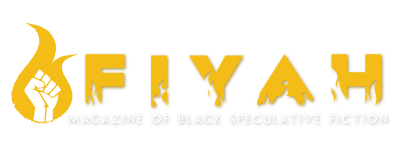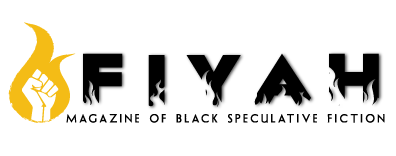The road to publication is not easy for anyone and comes with a number of hurdles. For black writers, these challenges are multiplied and because of institutional issues, the path seems almost impossible. But the resiliency of black folks always finds a way and for many black SFF writers that way was in the form of self-publishing.
At FIYAH, we do not snub our noses at those writers who chose this path. We salute them because they have decided to embark on a journey by themselves that in traditional circumstances would involve a team. So we wish to acknowledge those black indie SFF writers out there working hard and dropping a good product. Our Indie Spotlight feature seeks to amplify self-published Black writers with features of their work in our magazine and interviews featured here on the website.
This quarter’s spotlight feature interview is with Carole McDonnell. A segment of her novel THE CONSTANT TOWER can be found in the SUNDOWN TOWNS issue of FIYAH.
1) What pulled you to writing?
Daydreaming, sex drives, religion, my mother, and literature. A great combo. My mother had one those great memories. Back in the day, people memorized so many stories or literary passages because they didn’t have money to buy books. My mother was always walking around the house saying whole passages from Dickens, et al. Daydreaming. So many stories out there and much of them totally ignoring Black women. Why couldn’t we be great queens? Wasn’t it clear to everyone that Romeo and Juliet belonged to different races and to different religions? The little Black girl in me just couldn’t stop adapting movies and literary plots? Sex drives. Well, what does one do with a hormonal fantasy? If one is a writer, one lives in it. Then that fantasy world takes on a life of its own and after a while we love and know the characters so much, we want to give those characters to the world. Religion. I’m very religious. But I never could deal with the simplistic stereotypical religious stories I saw. So much Christian fiction were Left Behind knockoffs, or imitation C S Lewis/J R R Tolkien. Or pretentious allegorical. The snobby literature major in me just hated when those stories weren’t done right. Plus all those stories were so European-focused. The socialization of Black literature. I understood that Black literature was full of suffering, but I really hated being enlightened and being preached at. There was a time (this was when I was growing up forty-odd years ago) when almost every book was like a college course in suffering. The need to put all of myself in a story. So many published Christian stories could put off non-Christians. So many stories by Black folks put off non-Black readers (unless the white reader needed to read the book for a thesis or paper.) So many literary stories were boring. I set out to write a story that all aspects of me could fit in, and which anyone could read.
2) If you had to describe the hallmarks of a Constance Burris story to someone what would they be?
I am seriously transparent. My characters are written transparently, truthfully, and intimately. My characters do things, say things, think things that are honest and personal. Stuff that everyone thinks but that one rarely finds in regular stories.
3) Who are your biggest writing influences?
The Bible. Shakespeare. C S Lewis.
4) How does your blackness play into your stories?
My characters are often minorities in their worlds. Part of the Black experience is being outsiders and insiders in a larger cultural setting. They live in a diverse, multicultural world where there are racial issues, diverse religious beliefs, and cultural melding. Culture is very important to me. I go to a lot of trouble to do cultural and religious world-building. Then I show what happens when all these influences come together. On the whole, my stories always have different clans with different goals who end up working together …or not.
5) Black female characters do not get their due in SFF. How do you feel your writing is addressing that disparity?
First of all, I always want my main female characters to be dark-skinned like me. Because I never saw me in all those scifi/fantasy movies I used to watch. The women are either beautiful or plain, but their beauty is often described in an African way. I have a habit, which I hope isn’t a failing, in that a lot of my women are trapped, enslaved, suffering. I hadn’t read Octavia Butler before I started writing but apparently, that is a part of her storytelling as well. Cultural memory, maybe?
6) What’s your writing process? Do you have rituals?
Not really. I get up in the morning, listen to a lot of youtube videos, listen to sermons, Korean or Japanese dramas, hang out on Facebook. If I have rituals, those rituals only pop up when I’m writing love scenes or spiritual scenes. I’ll listen to a favorite Korean ballad or a religious song a zillion times in a row in order to get into the zone of a scene. But other than that, no real ritual. Just getting up in the morning typical everyday stuff.
7) Where do you draw inspiration from?
Old English ballads for stories like Wind Follower, Black is the Color of My True Love’s Hair. Dreams for stories like A Cry for Hire and The Constant Tower. Tragic Bible Princes.
8) You’ve written quite a lot. What story would you recommend to someone just getting into your work?
Depends. If you don’t want to deal with religion at all, and if you like a “tome” then you should try The Constant Tower. If you’re into fairytales, try Charcoal Bride and any story or novella that takes place in the Malku universe. The Malku universe is a world I’m trying to populate with stories. If you like apocalyptic romance Nephilim stories, try The Daughters of Men. My novel, “My Life as an Onion” is an interracial romance with magical realism. Very charismatic Pentecostal but..not really. Apparently, I have a talent for writing deeply religious stories in a normal non-religious way. If you want to look at some stories, try one of my story anthologies: Spirit Fruit or Turn Back O Time. If you like tribal Christian fantasy romance, try Wind Follower. Several of my stories are online. You can find The Gleaners, Black is the color of my true love’s hair, and A Thing of Beauty up at untoldpodcast. Homecoming at the Borderlands café is up at escapepod. Housewarming is on youtube. Some of my older stories and my newer works-in-progress are up at wattpad and also on the Radish-fiction moble app. So you can find them anywhere. I also have some poetry on wattpad and hitrecord as well. The one story of mine that has “legs” is Lingua Franca. It’s been taught in about three colleges that I know of. It’s about a planet of deaf inhabitants who have to deal with the Federation’s plan to change them. It’s one of my favorite stories, along with Changeling, A Cry for Hire, and Flight. I’d recommend those.
9) What’s the one story that you are looking forward to writing the most?
I really never know what a story is until it presents itself to me. Sometimes I just start writing and trust the story to come. Other times, the characters present themselves to me in a dream. Right now, I’m working on several mainstream stories: Black Girls Have Always Loved Cowboys, A Town for Timothy, and Who Gave Sleep and Who Has Taken It Away, a dystopian story about geographic and economic collapse in the USA. Of course, we have a black Juliet and a white Romeo. That’s one I’d like to finish.
Author Info
Carole McDonnell has spent most of her years surrounded by things literary. Her writings appear in various anthologies including “So Long Been Dreaming: Post-colonialism in science fiction,” edited by Nalo Hopkinson and published by Arsenal Pulp Press; Fantastic Visions III” anthology published by Fantasist Enterprises; “Jigsaw Nation” published by Spyre publications, “Griots: A Sword and Soul anthology,” edited by Milton Davis and Charles Saunders, “Life Spices from Seasoned Sistahs: writings by mature women of color,” “Fantastic Stories of the Imagination” edited by Warren Lapine and published by Wilder Publications. Her reviews appear in print and at various online sites. She lives in New York’s Hudson Valley with her husband, two sons, and their pets. Her novels Wind Follower and The Constant Tower were published by Wildside Books. Her other works include My Life as an Onion, The Charcoal Bride, Black Girls Have Always Loved Cowboys, Who Gave Sleep And Who Has Taken It Away?, A Town For Timothy, and The Daughters of Men. Her Bible studies include: A Fool’s Journey Through Proverbs, Blogging the Psalms, Scapegoats and Sacred Cows of Bible Study, and Seeds of Bible Study: How NOT to Study the Bible. Her collection of short stories, Spirit Fruit: Collected Speculative Fiction, is available on kindle. She lives with her husband, son, and pets in New York. When not writing, she teaches English as a Second Language to refugees and migrants or can be found dancing English Country Dances.


